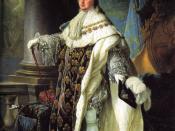The French Revolution was an unstable, blood-filled time. With 20,000 sent to the guillotine and an equal number to prison, it is not hard to find importance but rather to find meaning. The most crucial thing to look for in the revolution is justification, reasons that excuse or bring significance to the deaths of many. John Locke, a philosophe of the time, may have argued that a leader who does not provide his people with inalienable rights is grounds for dismissal in the form of regicide1. On the other hand Thomas Hobbes, also a philosopher, may have taken a different argument. It was his belief that 'man is a brute', therefore he needs a dictator to keep the peace. John Locke's idealistic view point if practiced properly could have provided the lower class of France with equality, something the were desperately in need of. The Thomas Hobbes approach which advocates control, could not have provided the people with such liberation, but in theory should be able to maintain the peace among the people, the peace that seemed so lacking during the French Revolution.
The French Revolution was a disaster for the following reasons: it happened too fast, it went too far, and it achieved too little.
Thomas Paine a radical thinker of the era once said 'Time makes more converts than reason'. With this quote we can see why revolution was successful in England, but not France. England slowly used the Magna Carta (1213), Petition of Rights (1628), and the Habeas Corpus Act (1679) to limit it's monarch. It was a long road that was by no means perfect. With monarchs who paid little attention to the act(s) in place during their reign and parliament, like James (1603-1625) and Charles I (1625-1649) it was hard to see progress quickly. These...

![Image taken from page 403 of '[The History of the French Revolution. Translated by F. Shoberl.]'](https://s.writework.com/uploads/1/11185/image-taken-page-403-history-french-revolution-translated-f-thumb.jpg)
